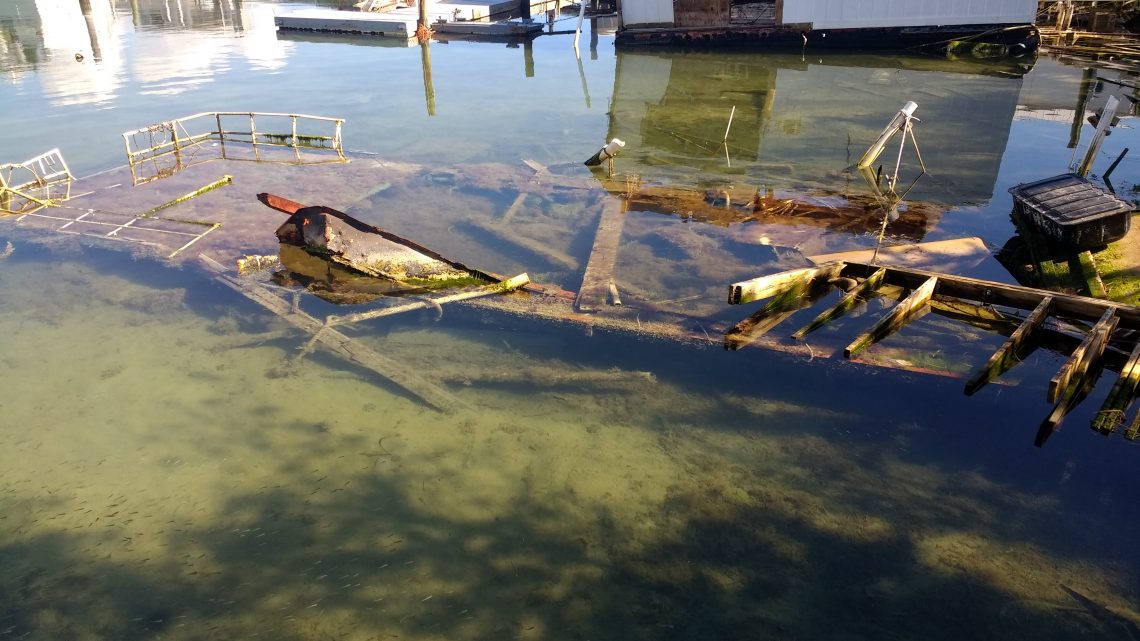Destroyed floating homeowners caught in bureaucratic nightmare after Irma
BY PRU SOWERS
KONK LIFE STAFF WRITER
There are hurricane victims and then there are other hurricane victims.
In the first category, federal, state, county and local governments swoop in to give aid: financial, temporary shelter, food. In the second category, however, virtually no assistance whatsoever.
About 10 families, residents of Hilton Haven Road, a classic Old Key West neighborhood along an unmarked road across from Taco Bell on North Roosevelt Road, fall into the second category. They live, or, rather, lived on floating homes. The rent was affordable, the views sublime and the neighbors friendly. It’s one of the few remaining residential enclaves in Key West where working class families and retirees who have been here for decades can still afford to live.
But Hurricane Irma – and the three tornados that pummeled down on Hilton Haven Road during the worst of the storm – hit this hidden neighborhood hard, in particular the floating homes moored to the docks along the waterfront. One landlord had four floating homes that he rented out affordably to locals. All are gone. A local dentist had 10 rental units on his floating homes. Only three are still usable. And Chris Dardoufas, a self-employed carpenter who lived on his floating home for the past 2.5 years, is lucky he sheltered in his across-the-street landlord’s house during the storm. All that’s left of his floating home is a sunken metal hull and a pile of debris on shore.
You might expect that the U.S. Coast Guard would help with removing the destroyed floating homes, just as it is helping remove dangerous sunken boats around the Keys. And you might expect the Federal Emergency Management Agency (FEMA) to give the floating home owners the same $20,000 it is giving to on-land homeowners in the middle Keys, the hardest hit by Irma, to help make their damaged homes at least partially livable until more comprehensive repairs take place.
But the Hilton Haven residents who lost their water homes are not receiving any of that. The problem lies in definitions and private roads and the 185 feet of private bay bottom some of the residents own. Although there are piles of debris from the smashed floating homes, neither the city of Key West or Monroe County will remove it because Hilton Haven is a private road. And because the floating homes are not boats, with an engine or a definable bow or stern, they don’t come under the Coast Guard’s mandate from FEMA to remove sunken vessels. And because some of the bay bottom is privately owned, it is not a legal navigable waterway, meaning the Coast Guard does not take responsibility for keeping the waterway clear of debris that would endanger boaters, even though nail-studded planks float out away from the sunken homes every day.
Making matters worse, insurance companies do not offer policies for floating homes. They will for boats, even houseboats, but not for floating homes. So, none of the floating home owners were covered.
“FEMA is giving me $1,000 to clear up this debris field,” said Dardoufas, looking at his sunken hull and the smashed remains of his home that used to be attached to it. “One contractor gave me a quote of $25,000 just to remove my metal hull.”
To be fair, Dardoufas also received $3,300 in rental assistance for November and December from FEMA. But he does not know if that will be extended in 2018. In the meantime, he and his girlfriend are living in one of his landlord’s bedrooms across the street without the funds to rebuild.
Dardoufas and the other floating home owners were initially hopeful. The Coast Guard visited the site shortly after the hurricane and declared it an environmental hazard zone because of the sunken septic tanks, propane containers and appliances. But the offer to help remove the debris evaporated, Dardoufas said, as the Coast Guard began focusing on clearing sunken vessels out of public waterways.
“We’re polluting the water. That’s why they told us there were going to clean it up for us,” he said, looking at the sunken remains of his home. “Now, everybody seems to be looking for a way to back out.”
Captain Bill Grosscup had lived on his floating home since 2010. He owned his dock and 440 feet of bay bottom stretching out under pristine waters off Hilton Haven Road. He sheltered in his over-the-water boat house until he felt the concrete structure start to shutter. He ran down the steps to his car, sitting there where he saw one of the tornados and his neighbor’s roof sail away. When the storm let up, he went back across the street to see his floating home a twisted wreck smashed against the shore.
“It’s gut-wrenching when you look out and see 28 years of life down the rat hole,” he said, looking at the destroyed structure that housed his belongings, accumulated since he moved to Key West in 1946.
Two days later, two Coast Guard officials came down the road. They told Grosscup they had been mandated by the federal Environmental Protection Agency (EPA) to crush and dispose of the destroyed floating homes.
“They put the red tag up and said, ‘don’t worry. We’ll be out here with cranes and here’s the phone number,’” said Grosscup, who is called Captain Bill by pretty much everyone.
When nothing happened, Grosscup began calling, leaving voicemail messages for the Coast Guard at the number he was given. He finally received a callback in mid-November. The caller said the EPA had ended its mandate to remove floating homes and the Coast Guard was only authorized to remove sunken boats. The caller recommended that Grosscup call the state Fish and Wildlife Conservation Commission. He did. They referred him to the Monroe County Emergency Operations Center. They referred him to Key West officials.
“Notice the pattern? Passing the buck to the next to the next to the next,” Grosscup said, sitting on the deck of another floating home he had been renting to local workers that sank in shallow water but was able to be raised.
Grosscup received the same message from city officials, who said since Hilton Haven Road is a private roadway, it would not receive the same debris removal services as the rest of the city. But when asked why taxpayers should help private road residents on private bay bottom acreage, Grosscup pointed to other municipal bailouts of private property.
“We’re taxpayers, pure and simple. Our taxes help them if they have a fire. Our tax dollars help them when they have to lope off tree branches to keep them from crashing into a roof. Plus, they’re using tax dollars to clean out the [county] canals,” he said.
That defense has won over at least one Key West official, Commissioner Sam Kaufman, who represents the area. Kaufman visited the site and met with the owners, coming away convinced they deserved public assistance.
“These are hurricane victims,” he said about Hilton Haven residents. “What makes them different? Because they live on a floating structure?”
Kaufman said Congressman Carlos Curbelo and state Rep. Holly Raschein are pushing the Coast Guard and the Fish and Wildlife Conservation Commission to reconsider their decision about the Hilton Haven floating homes. But that is not looking positive, he said. The Coldwell Banker Florida charitable foundation has also been approached about making grants or loans to the victims to help pay for debris removal and rebuilding. A decision is expected on Tuesday, Jan. 16, but that is not looking good either, Kaufman said.
A last-ditch effort might come from the city in the form of low-interest loans but Kaufman doesn’t yet know what his commission colleagues will say to that. He said he is willing to bring a resolution to the floor if funding is denied by Coldwell Banker.
“At the end of the day, they [city officials] want to see that all options are exhausted. We’re not there yet with the city taking action,” he said.
But something has to happen quickly. There is every possibility that unless the sunken homes are removed in the next month or two, the city could begin issuing citations to the owners for potential pollution violations and lack of debris removal, Kaufman said.
“If all options are exhausted, the city is going to have to take action, one way or the other,” he said.
[livemarket market_name="KONK Life LiveMarket" limit=3 category=“” show_signup=0 show_more=0]





No Comment